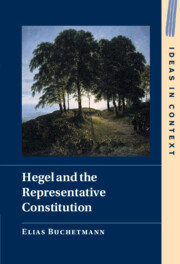Book contents
- Hegel and the Representative Constitution
- Hegel and the Representative Constitution
- Copyright page
- Dedication
- Contents
- Acknowledgements
- Conventions and Abbreviations
- Introduction
- Chapter 1 The Constitutional Question in Post-Napoleonic Germany
- Chapter 2 On the Nature of Constitutions
- Chapter 3 The Distribution of Power
- Chapter 4 Debating the Two-Chamber System
- Chapter 5 The Representation of Interests
- Conclusion
- Bibliography
- Index
Chapter 5 - The Representation of Interests
Published online by Cambridge University Press: 13 April 2023
- Hegel and the Representative Constitution
- Hegel and the Representative Constitution
- Copyright page
- Dedication
- Contents
- Acknowledgements
- Conventions and Abbreviations
- Introduction
- Chapter 1 The Constitutional Question in Post-Napoleonic Germany
- Chapter 2 On the Nature of Constitutions
- Chapter 3 The Distribution of Power
- Chapter 4 Debating the Two-Chamber System
- Chapter 5 The Representation of Interests
- Conclusion
- Bibliography
- Index
Summary
Chapter 5, in parallel to the preceding one, focuses on the other, elected chamber of the Estates Assembly (or Parliament) and discusses Hegel’s characteristic notion of a representation of interests, along with the broader societal conditions for successful representation. The chapter first reconstructs and contextualises the electoral mechanism as envisioned by Hegel and elucidates the political significance of corporation membership, which connects Hegel’s civil society and state. In this context, special attention is paid to the exclusion of women, while Hegel’s purported negligence of farmers is refuted. The chapter then sets out the conditions Hegel considered necessary for the successful representation of societal interests, which include freedom of the press and trials by jury, notwithstanding his ambivalent attitude towards public opinion. The final section shows that these very preconditions were under siege at the time Hegel was writing, following the politically motivated murder of Kotzebue and the institution of the so-called Karlsbad decrees. The direct bearing of these circumstances on the publication of Hegel’s Philosophy of Right rounds off this contextual study.
Keywords
- Type
- Chapter
- Information
- Hegel and the Representative Constitution , pp. 167 - 208Publisher: Cambridge University PressPrint publication year: 2023

